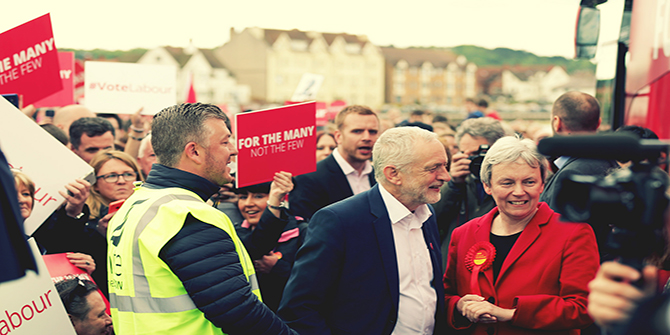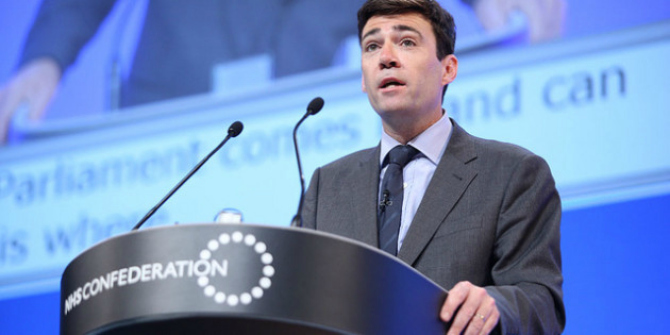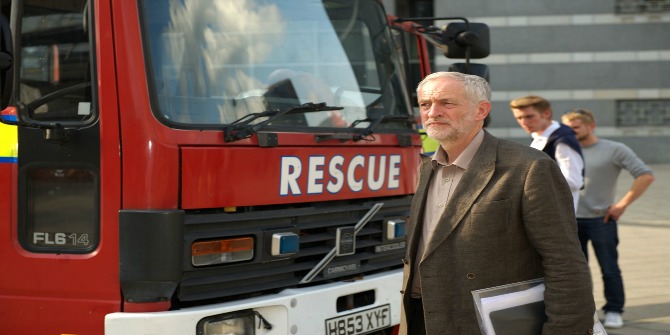The 2015 general election looks set to be an exceptionally good one for the SNP, who look set to not only supplant Labour as the largest party north of the border, but to rout it. Sean Swan argues that this could see considerable change in the way British politics is conducted in future, particularly given their possible involvement in any minority or coalition government emerging from the election.
In 2005 Labour won a General Election on 35.2 per cent of the vote; in 2014 Yes Scotland lost the independence referendum on 44.7 per cent. Arendt Lijphart, states that a key feature of the Westminster system of government is a “disproportional system of elections”. This disproportional electoral system – First Past the Post – could potentially transform the 44.7 per cent referendum Yes vote into over 80 per cent of Scottish seats in a general election.
The Yes side’s response to defeat was political mobilisation via the SNP, aiming to hold the balance of power following the May general election. By 22 September SNP membership had jumped 70 per cent. Over 18,000 people had joined since the referendum, bringing membership to a record 43,644. By March, membership had reached 100,000, making the SNP the third largest UK party by membership. The SNP today is what Labour once was – a movement.
Alex Salmond resigned as SNP leader and First Minister, to be succeeded in both offices by his highly competent deputy, Nicola Sturgeon. Far from retiring, Salmond is standing in the general election. If Salmond’s resignation was ultimately a tactical repositioning in preparation for a new battle, the same could hardly be said of the dramatic resignation of Scottish Labour leader Johann Lamont in October. Lamont explained her resignation in Scottish particularist terms of the failure by the UK Labour leadership to give Scottish Labour more autonomy, adding that Labour in Westminster “do not understand” Scottish politics. Whereas SNP membership was sky-rocketing, Labour were “struggling to get beyond around 13,000”.
The obvious target for a resurgent independence movement is Labour. Not only are Labour the party to beat in Scotland, but Labour had committed what Scots view as something close to an act of gross indecency – during the Referendum campaign they had stood “shoulder to shoulder with the Tories”. The potential cost of associating with the Tories was demonstrated in the 2011 Holyrood elections, when Scots rejected the Lib Dems in protest at their coalition with the Conservatives, costing them 12 of their 17 seats. The referendum had itself been a warning to Labour. Scotland voted No, but Labour heartlands like Glasgow had voted Yes.
The General Election
The predicted outcome of this election is a hung parliament in which the SNP are the third largest party and hold the balance of power. This rules out a single party government and three possible scenarios arise:
1) Honest Labour
A Labour/SNP deal is the easiest fit. Labour is already pledging more powers for the Scottish Parliament. The SNP has said it is willing to do a deal with Labour. Labour have ruled out a coalition, but not a confidence and supply deal. The red line for the SNP is scrapping Trident. This is problematic because in the event of a confidence and supply deal, a Labour government could renew Trident in the face of SNP opposition by relying on Tory support. For the SNP to truly make Trident a red line, they would have to be prepared to trigger a vote of confidence on the issue and potentially bring down a Labour government – a politically dangerous move for the SNP.
For the SNP any deal with Labour would give the lie to the “vote SNP get Tories” claim, and help copper-fasten their position as the dominant party in Scotland. The SNP could force Labour to the left. Policies such as unilateral nuclear disarmament were once (pre-Blair) Labour policies. The SNP would also oppose increased austerity. An SNP/Labour deal might, in short, produce an ‘old Labour’ government. An ‘old’ Labour government sans a majority in England and put in power by the SNP, would inflame the ‘English Question’. Gus O’Donnell, former head of the civil service, argues it “would put the question of Scottish independence back on the agenda”.
Alternatively, Scottish separatism is partially driven by opposition to variants of Thatcherite/New Labour neoliberalism. A leftwing Labour government might see the re-emergence of cross-cleavage cutting left/right politics and provide an acceptable alternative to separatism.
2) Devo Max meets Max EVEL?
A Conservative/SNP deal has been ruled out by the SNP and would normally be considered mutually unconscionable, but is still conceivable. Scotland has nothing to offer the Tories except Labour and SNP MPs, as Vernon Bogdanor points out, many Conservatives “believe that Scotland is another country with which they need not concern themselves”. Furthermore, the West Lothian Question and EVEL provide ammunition to Tory rivals on the right such as UKIP. What if the Tories were to view Scotland as a lost cause?
A ‘divorce settlement’ is imaginable in which full Devo Max – Scottish control over everything except defence and foreign relations – is exchanged for a radical reduction in the voting rights of Scottish MPs in Westminster and/or a reduction in the number of MPs returned from Scotland: call it ‘Max EVEL’. This requires the victory of Tory pragmatism over Unionist ideology, and for the SNP to risk a one-off supping with the Devil in exchange for Devo Max.
But the devil would be in the detail and trust in short supply. The SNP would have uppermost in their minds the fate of the Lib Dems and the (broken) promise of electoral reform following the creation of the Lib Dem-Tory coalition.
3) Alex Salmond, Leader of the Opposition
It is always possible for Labour and the Conservatives to lock out the SNP by doing a deal together. Germany and the Social Democrat/Christian Democrat grand coalition provides an obvious model. (A variant of this already exists in Tory/Labour general election voting pacts). But there are political difficulties here. It would cause a haemorrhaging of Conservative support to UKIP, and of Labour support to the SNP and the Greens. The SNP, as the largest non-Government party, would also become the Official Opposition. A purely Scottish Opposition would put the British Constitution to the torture. It is doubtful, for these and other reasons, whether a Labour/Conservative coalition would be countenanced.
The Systemic crisis
The fundamental question is whether a ‘British’ nation still exists. 62.4 per cent of Scots reject a British national identity, identifying as ‘Scottish only’. A shared party system is central to ‘British’ politics, and if the SNP supplant Labour in Scotland, it will be “harder than ever to talk about ‘British politics’”. A “two-party system”, and “one-party and bare majority cabinets” are another two of Lijphart’s key features of the Westminster system. Both arise from the disproportional electoral system and strongly favour the Tories and Labour. There is little incentive for Labour and Conservatives to reform an electoral system so advantageous to them, but it is difficult to see how a ‘British’ party system can be maintained short of the introduction of PR that would at least see some Tories returned by Scotland.
Of course it would also mean the permanent end of single party government and a two party system (but this may be inevitable anyway, given the decline in the share of the vote won by Labour and Tories combined in recent elections). The current crisis requires something close to Scottish independence or PR or the re-emergence of traditional cross-cleavage cutting left/right politics. None of this is likely, the British crisis will rumble on.
Note: This article was originally published on the Democratic Audit blog and gives the views of the author, and not the position of the British Politics and Policy blog, nor of the London School of Economics. Please read our comments policy before posting.
Sean Swan is a Lecturer in Political Science at Gonzaga University, Washington State.








Good. Perhaps the rise of SNP will bring about the prosecution of VIP pedophiles in England, as opposed to the ongoing coverup.
“The SNP would have uppermost in their minds the fate of the Lib Dems and the (broken) promise of electoral reform following the creation of the Lib Dem-Tory coalition.”
What promise was broken? A referendum on AV was in the coalition agreement, and one was held.
Yes, you are totally correct about the referendum, though it is a somewhat technical point. The referendum was lost, with most of the financing for the – supposedly neutral – ‘No’ side coming from the Tories
http://www.theguardian.com/politics/2011/may/02/no-to-av-vote-tory-party-funding and with some questionable tactics used in the referendum campaign by the Tories http://www.theguardian.com/politics/2011/may/03/av-referendum-huhne-confronts-cameron
I’m talking more spirit than letter. The Lib Dems joined the coalition hoping for AV; they didn’t get it. And the Tories were instrumental in ensuring they didn’t get it. But you are still correct to point out that the technical promise of a referendum was fulfilled.
Er… ‘full’ Devo Max?
You are right to say that Devo Max is everything bar Defence and Foreign affairs. That is well understood by the Scottish electorate.
Anything less than that is not a ‘partial’ Devo Max… its just Devo something else.
Forgive me my tautologies 🙂 I can only plead in my own defence the need to explain the term to those not familiar with it.
Probably worth noting that *both* SNP and Labour have ruled out a coalition but both parties have left open the possibility of some form of collaboration.
Interesting to see that you don’t rule out a Labour / Conservative coalition because of ideological differences. A common perception, not just in Scotland, is that there is little enough policy difference between those parties. Part of the SNP appeal as you note is that, being centrist, it is well to the left of New Labour.
“Part of the SNP appeal as you note is that, being centrist, it is well to the left of New Labour.” Yes, the rightward drift of New Labour is also part of what is driving independence. I’d tend to agree with Nairn on the broader role of neoliberal globalisation too – especially as he outlines it in the introduction to the 25th anniversary edition of ‘Break up’
Pretty astute analysis with one exception, we are closer to an independent Scotland than ever before.
I always say Scottish independence is a process, not an event (I’m paraphrasing somebody’s comment on Devolution, but can’t recall whose just now – apologies), but we may also be about to enter an era of the ‘politics of frustration’
“The SNP today is what Labour once was – a movement”… We’re more than this, much more, we’re a nation finding itself after years of being blinded by misrepresenting Unionist publications. We liked the feeling of self-determination during the Referendum, that moment when we held independence in the palm of our hands.
Bear this in mind; had it been a ‘fair fight’, an honest campaign conducted properly by the msm, then we’d probably be independent today, but had we still lost, then we would’ve been more accepting of the result. But no, it could never have been a fair fight – we didn’t like this and we don’t like this. All but one Scottish publication – The Sunday Herald – conducted themselves in a disgraceful manner, as did the BBC. Had it not been for social networking sites, we would’ve been lied to, conned and cheated and never known a thing about it.
It wasn’t only the lies and distortions of the Referendum, it was the constant and corroborated tweeting of historical injustices, buried lies and dark tactics – we’ve been taken for fools for generations. It was as if all transgressions perpetrated by Westminster government, historical and current, were being presented on a conveyor belt on the lead-up to our independence, each day spewing-forth another kick in the teeth for the Scottish people.
We could give a tu-penny damn what party we’ll be dealing with after May – we now want a full independent Scotland, for better or worse, for richer or poorer. We are a mighty army and we’re not going away until we’re on our own.
I have a post on the PSA blog later this week that is more in line with what you’re saying. We’re always slaves to word limits and can’t say it all in one article